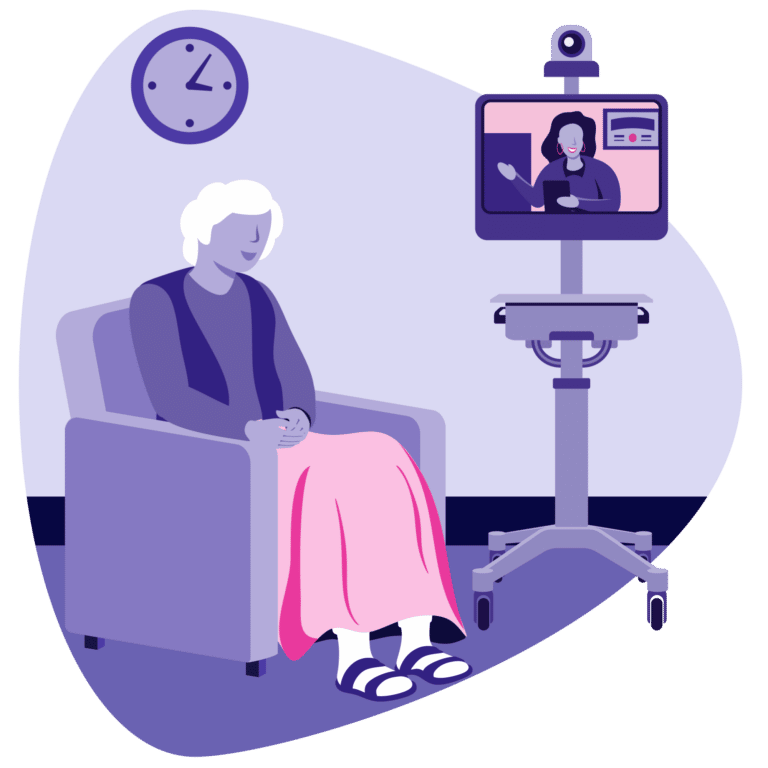Over the past few years, the number of Psychiatric Mental Health Nurse Practitioners (PMHNPs) has been steadily increasing — passing the 12,000 mark in 2016.
In many states, PMHNPs can evaluate, diagnose, and prescribe medication to patients — just like their psychiatric counterparts. That means organizations can incorporate PMHNPs into their overarching strategies to help address provider shortages, meet patient needs, and decrease wait times.
Healthcare organizations looking to expand access to behavioral health services may be wondering which provider type is best for their community. Here is all the information needed to make an informed decision about hiring a PMHNP.
PMHNPs are highly-trained psychiatric care providers who can provide comparable treatment to psychiatrists
Due to the nationwide provider shortage, finding psychiatrists for your care team might not be an option. Thankfully, PMHNPs are just as equipped to provide the high-quality care patients need. While PMHNPs and psychiatrists have different training and education requirements, the treatment they can provide is very similar.
- PMHNPs and psychiatrists have graduate-level education. PMHNPs are required to have either a Master’s or Doctorate in nursing to sit for the PMHNP certification exam.
- Once a PMHNP is certified, they can practice across the patient lifespan. This ability means they can treat children, adolescents, adults, and geriatric populations.
- Psychiatrists can also treat patients across their lifespan. However, PMHNPs often opt to undergo further fellowship training that equips them to treat specialized patient populations.
- Both PMHNPs and psychiatrists are eligible to earn an X-waiver, which allows them to prescribe buprenorphine to treat patients with substance use disorders.
PMHNPs receive training around holistic care — which makes them a good provider fit for CMHCs and FQHCs
PMHNPs can significantly benefit your organization, especially if you serve patients from vulnerable populations, like Community Mental Health Centers (CMHCs), Certified Community Behavioral Health Clinic (CCBHCs) and Federally Qualified Health Centers (FQHCs).
Recent studies have found that the quality of PMHNP care is similar or equal to that of psychiatrists. Additionally, much of the training they receive works well for the kinds of patient populations CMHCs and FQHCs often see.
Like psychiatrists, all PMHNPs receive training around assessing, diagnosing, and treating patients with mental health needs. However, PMHNPs also focus on holistic care, and they have skills and experience in treating the whole patient.
Their specialized training includes:
- Psychotherapy and behavioral health conditions: PMHNPs receive extensive training in psychotherapy and can effectively treat common behavioral health conditions, including mood disorders, anxiety, substance use, depression, ADHD, and schizophrenia.
- Crisis intervention and directing patient care planning: PMNHPs have experience in crisis intervention and can utilize de-escalation techniques to support patients who enter your health center in a state of distress. PMHNPs are also skilled at care coordination and can help provide consultations and referrals to psychiatrists and other specialists if a patient’s case requires it.
- Collaborative care: PMHNPs are trained to work in collaborative care teams, where they may work with psychiatrists, social workers, community managers, or nurses to find a care plan that can treat a specific patient’s needs effectively.
- Effective communication with patient families: PMHNPs are equipped to interact with patient families or caregivers — particularly when treating young patients or patients from vulnerable populations.
If these skills and experiences would benefit your organization, a PMHNP may be a good fit for you.
If you’re considering hiring a PMHNP, make sure you understand your state’s regulations
Unlike psychiatrists, PMHNPs are subject to state regulations that dictate the kind of care they can provide. For example, a PMHNP in Texas could see patients and provide assessment and diagnosis. However, they would not be able to prescribe without having an established Prescriptive Authority Agreement in place with a physician. However, in Oregon, a PMHNP can prescribe medication without a physician’s collaboration and can even practice independently.
States fall into three regulatory categories:
- Full practice: In full practice states, PMHNPs can evaluate, diagnose, and treat patients by prescribing medications without consulting with a physician. In these states, PMHNPs can also set up independent practices. There are currently 23 full practice states across the country.
- Reduced practice: Reduced practice states limit PMHNPs’ ability to practice fully and independently. Often, PMHNPs will be required to hold a collaborative agreement with a psychiatrist in order to provide full patient care and prescribe medications to treat their patients.
- Restricted practice: In restricted practice states, PMHNPs must work directly with a psychiatrist or other healthcare provider and cannot prescribe medications to patients without that psychiatrist’s supervision. There are currently 12 restricted practice states in the U.S.
When considering which provider type to hire, you should research what kinds of regulations exist in your state. If you live in a restrictive state, plan to have consulting psychiatrists available to prescribe medication in collaboration with your PMHNP. Telehealth can offer a better solution to connect patients with care while working in their scope of practice, regardless of where nurse practitioners practice.
Hiring PMHNPs can be a challenging task, so consider the recruitment resources available
If you’ve decided PMHNPs are a good fit for your organization, there are several recruitment options and partners you can consider:
Nurse practitioner associations: If you’re looking for a local PMHNP, you can research nurse practitioner associations at the regional and state level. These associations often have job boards where you can post potential openings and get your position in front of qualified candidates.
Local universities: Universities with nursing programs will often also have job boards and can be beneficial partners when looking for a PMHNP in your area.
Telepsychiatry: Telepsychiatry partners like Iris Telehealth can be valuable resources to help your organization source and vet potential PMHNPs utilizing telehealth before adding them to your team. Using a service like this will give you access to PMHNPs at a national level, opening up a network of qualified providers and helping to get them licensed in your state.
Provider matching: Finding the right provider for your organization is key to the success of your patients and your care team. That’s why at Iris, we help organizations find a provider who meets their organization’s needs and aligns with their team’s culture and values. This process, called provider matching, helps bring stability to organizations, providers, and the patients they serve.
Your decision to use a PMHNP should be all about your patients
Because psychiatrists’ availability is limited across the country, particularly in rural communities, it’s essential to consider how your organization can best serve your patient populations and provide high-quality care.
PMHNPs bring valuable experience dealing with sick patients and vulnerable populations, which can be a major benefit to your organization. This is particularly true for CMHCs and FQHCs, who often see a high volume of patients from vulnerable populations.
PMHNPs are also incredibly passionate about their work. In an interview with one of our own PMHNPs, Dale McQueeney, she says that one of the most rewarding parts of her job is seeing patients reduce use or achieve and maintain abstinence from substances.
Most importantly, PMHNPs can serve as key behavioral health providers. They can extend access to your services, meet patient needs, decrease wait times, and become long-term, collaborative team members.
To learn more about how Iris Telehealth can help you source PMHNPs for telehealth, contact us, and we’ll help you get started.


